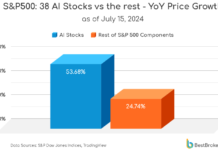
The AI in media and entertainment market is anticipated to experience an impressive 17.5% CAGR in AI applications, with a valuation projected to reach US$ 51.37 billion by 2034. AI is being utilized for predictive analytics, recommendation engines, customer journey mapping, and audience segmentation to enhance the user experience. The AI in the media and entertainment industry is foreseen to be valued at US$ 10.24 billion in 2024.
Business Opportunities for AI in Media and Entertainment Industry
· The media and entertainment industry is utilizing AI solutions to upgrade its content, personalize customer experiences, and enhance profitability through cutting-edge technology and data-driven insights.
· Organizations facing digital transformation require adaptability to achieve success, embracing change and adapting to their environment, allowing the media brands to adapt to meet and exceed expectations.
· Through the provision of a modular suite of services, Live Enterprise promotes teamwork and rapid increase in output in business organizations. It enhances decision-making processes on the spot, provides real-time information, and enables people to see data, leading to improved efficiency and agility.
· Artificial intelligence enhances analytics by analyzing unstructured data using machine learning and natural language processing. It provides a competitive advantage to organizations through sentiment analysis and dialogue abilities, improving decision-making and customer interactions.
Vital Trends for AI Adoption in Media and Entertainment Sector
Widespread Demand for the AI-generated Melody Hits the Records
AI-generated music, a unique blend of various tones and genres, is a groundbreaking, innovative approach to music composition that offers influential benefits to the music industry. Music recommendation systems, such as Shazam and Spotify, utilize user data to build profiles based on artist, tempo, genre, and mood. AI is revolutionizing audio mastering, providing artists with affordable and efficient solutions.
Despite ongoing debates about the superiority of AI-assisted mastering over traditional techniques, automated mastering services like LANDR are undeniably improving audio quality and expediting the production process.
Artificial Intelligence Gains Momentum in Gaming Sector
AI has significantly improved the online gaming industry by automating tasks like animation, character modeling, music composition, and content creation. This has led to cost savings and increased productivity, enhancing the realism of 3D models and original soundtracks.
The gaming industry clutches AI as it enhances game design by improving NPCs, mechanics, and realistic behaviors. It also provides personalized suggestions based on player preferences, thereby dynamically tailoring in-game content and delivering unique gaming experiences.
The gaming industry is embracing adaptive difficulty, a system that uses real-time player behavior analysis to balance challenge and accessibility. AI integration enhances user experience and interfaces, further improving gameplay dynamics.
Rise of AI in the Digital Content Creation on OTT platforms
OTT platforms use AI to create personalized music and video content, advancing user engagement and supporting businesses to develop their user base. The demand for online advertising on OTT platforms, using AI services like Google AdSense and AdWords improves campaign effectiveness and conversion rates.
AI also aids in media regulation by identifying and eliminating objectionable information, ensuring appropriate distribution based on user age and gender, and automating content moderation. Online streaming services use AI to enhance user experience, classify genres, and discover new content by analyzing cast and crew.
Country-wise Insights
Progressions in AI Technology in the United States Revolutionizes Media Industry
The AI in media and entertainment market in the United States is anticipated to experience a CAGR of 11.6% in the upcoming decade. This is driven by investments in AI-based virtual production software solutions, particularly in voice and speech recognition. For instance, Sonos Inc. used dialect and accent audio collection from Globalme Localization to enhance its voice recognition engines. As a result, it integrates intelligent home assistants with wireless speakers.
Given large investments in AI projects and other research and development initiatives, the entertainment industry in the United States is projected to provide innovation grounds for industry expansion. For instance, Movies such as Ex Machina, Ready Player One, Alita, Blade Runner 2049, and Her exhibit the influence of AI on flick imagination and raise profound questions about its potential and ethical complexities.
Industry Leaders Collaborate with Other Tech Players for Maturation of AI-driven Media in Germany
Germany is foreseen to become a significant player in AI software due to numerous media and technology companies and the evolution of next-generation technologies, with a projected 9% CAGR in demand for AI in media, including storytelling and content generation.
For the development of the media industry, German companies are collaborating with different technology companies present in other sectors. For instance, in May 2024, Infosys is anticipated to offer AI technology to Germany-based Handelsblatt Media Group for storytelling and compiling global economic and financial reports.
China’s OTT Platforms Evolve the Need for AI
An 18% CAGR is predicted for the AI in media and entertainment market in China as companies belonging to this country are transforming the OTT strategy with the integration of AI engines for leveraging behavioral and real-time client data for contextualized communication.
China’s online streaming companies like iQIYI, Tencent Video, Youku, and Bilibili offer personalized user experiences based on data accumulation. For instance, China Media Group (CMG) launched its first AI-produced multilingual microdrama, “Chinese Mythology,” in March 2024. AI is used to suggest content, resolve buffering and data loss issues, and continuously learn from customer experience to enhance viewer engagement.
Australia’s Media Cultivates the Demand for Generative AI Policies
Between 2024 and 2034, Australia experienced a remarkable CAGR of 21% in the generative AI in the entertainment sector, and such a trend is anticipated to continue throughout the projected timeframe. Australian government and private organizations have found that strict policies over AI use are lacking, causing concern about the impact of generative AI on misinformation and disinformation.
For instance, research by RMIT University, Washington State University, and QUT Digital Media Research Centre indicates that factors like social media sharing speed and algorithmic bias are beyond control. The Australian AI in media and entertainment market is foreseen to grow in the upcoming decade with the development of rigid AI rules.
Gamers in Japan Welcomes AI-driven Content with Open Arms
Japan’s AI in media and entertainment market is on the brink of revolution with the evolution in AI technology, which is anticipated to register a CAGR of 8.3% from 2024 to 2034.
Several online media platforms in Japan are employing AI technologies to inflate their consumer base. For instance, Tsumugi-nen, a popular virtual YouTuber in Japan, is an AI-generated talent developed by Hayato Akedo and his AI talent agency, Pictoria.
Japan’s entertainment industry is experimenting with AI-related projects, including tea commercials, glamour photography books, and manga storylines. Japan’s affinity for futuristic technology and culture is anticipated to lead to a progressive outlook toward AI integration.
Competitive Analysis of the AI in Media and Entertainment Market
Recent Developments in the AI in Media and Entertainment Sector
· In April 2024, Shopsense AI will launch a retail media platform with Paramount Global as its inaugural partner, enabling advertising and revenue opportunities for broadcast and streaming networks. Paramount Global will debut Shopsense’s mobile shopping experience during the CMT Music Awards.
· In April 2024, SymphonyAI launched a predictive and generative AI-based Media Copilot, enabling users to analyze content performance across distribution platforms and revenue models, providing AI-driven insights for profitable decision-making.
· In April 2024, Samsung Electronics showcased its 2024 Bespoke AI home appliances at three “Welcome to BESPOKE AI” media day events in Seoul, Paris, and New York City, showcasing the convenience of a smart home and its “AI for All” vision.
· In March 2024, the media and entertainment company Deluxe collaborated with AI and ML solutions firm AppTek to improve content localization and workflow efficiency, offering tailored AI solutions to studios and content distributors globally.
· In February 2024, Saudi Arabia launched the AI Center for Media and Future Camp of Generative AI for Media, aiming to enhance Saudi media’s capabilities and contribute to the country’s GDP.
Source: Future Market Insights

















